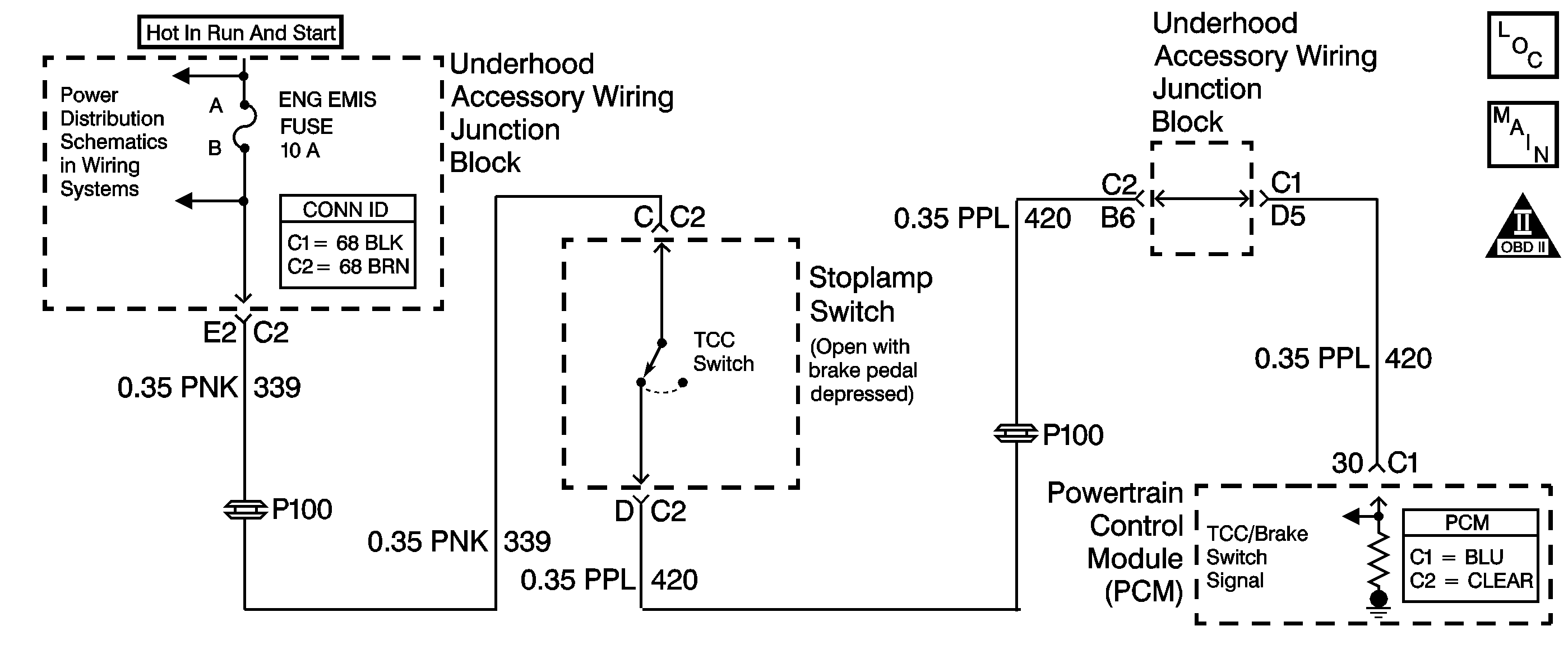
Circuit Description
The TCC brake switch indicates brake pedal status to the PCM. The TCC brake switch indicates that the brake pedal is either applied or released. The normally-closed switch supplies battery voltage to the PCM. Applying the brake pedal opens the TCC brake switch, interrupting voltage to the PCM. When the PCM receives 0 volts at the TCC brake switch input, the PCM turns OFF the torque converter clutch pulse width modulation (TCC PWM) solenoid valve.
If the PCM detects an open brake switch (indicating pedal applied) during a number of accelerations, then DTC P0719 sets. DTC P0719 is a type C DTC.
Conditions for Running the DTC
No VSS DTC P0502 or P0503.
Conditions for Setting the DTC
The TCC brake switch indicates continuously OPEN (0 volts) for more than 15 minutes and the following conditions occur 8 times consecutively.
| • | The vehicle speed is less than 8 km/h (5 mph); |
| • | Then the vehicle speed is between 8 and 32 km/h (5 and 20 mph) for at least 3 seconds; |
| • | Finally, the vehicle speed remains above 32 km/h (20 mph) for 6 seconds. |
Action Taken When the DTC Sets
| • | The PCM does not illuminate the malfunction indicator lamp (MIL). |
| • | The PCM disregards the TCC brake switch for TCC scheduling when all of the following conditions are met: |
| - | The TP angle is greater than 6%. |
| - | The vehicle speed is greater than 60 km/h (37 mph). |
| - | The TP angle was previously greater than 12% while the vehicle speed was greater than 68 km/h (42 mph). |
| - | The TCC brake switch has not indicated OFF for more than 2 seconds this trip. |
| • | The PCM records the operating conditions when the Conditions for Setting the DTC are met. The PCM stores this information as Failure Records. |
| • | The PCM stores DTC P0719 in PCM history. |
Conditions for Clearing the DTC
| • | A scan tool can clear the DTC. |
| • | The PCM clears the DTC from PCM history if the vehicle completes 40 warm-up cycles without a non-emission related diagnostic fault occurring. |
| • | The PCM cancels the DTC default actions when the fault no longer exists and the DTC passes. |
Test Description
The numbers below refer to the step numbers on the diagnostic table.
Step | Action | Value(s) | Yes | No |
|---|---|---|---|---|
1 | Did you perform the Powertrain Diagnostic System Check? | -- | Go to Step 2 | Go to Diagnostic System Check - Engine Controls in Engine Controls |
2 |
Important: Before clearing the DTCs, use the Scan Tool in order to record the Failure Records for reference. Using the Clear Info function will erase the stored Failure Records from the PCM. Does the Scan Tool display Closed? | -- | Go to Intermittent Conditions in Engine Controls | Go to Step 3 |
3 |
Important: The condition that affects this circuit may exist in other connecting branches of the circuit. Refer to Power Distribution Schematics in Wiring Systems for complete circuit distribution.
Was the fuse open? | -- | Go to Step 4 | Go to Step 5 |
4 |
Important: The condition that affects this circuit may exist in other connecting branches of the circuit. Refer to Power Distribution Schematics in Wiring Systems for complete circuit distribution. Test the ignition 1 voltage circuit (CKT 339) of the TCC brake switch for a short to ground between the fuse block and the TCC brake switch. Refer to Circuit Testing and Wiring Repairs in Wiring Systems. Did you find and correct the condition? | -- | Go to Step 10 | -- |
5 |
Caution: When you are performing service on or near the SIR components or the SIR wiring, you must disable the SIR system. Refer to Disabling the SIR System. Failure to follow the correct procedure could cause air bag deployment, personal injury, or unnecessary SIR system repairs. Connect a fused jumper wire from terminal C to terminal D of the TCC brake switch connector. Does the Scan Tool display Closed? | -- | Go to Step 8 | Go to Step 6 |
Test the ignition 1 voltage circuit (CKT 339) of the TCC brake switch for an open between the fuse block and the TCC brake switch. Refer to Circuit Testing and Wiring Repairs in Wiring Systems. Did you find and correct the condition? | -- | Go to Step 10 | Go to Step 7 | |
7 | Test the signal circuit (CKT 420) of the TCC brake switch for an open between the PCM and the TCC brake switch. Refer to Circuit Testing and Wiring Repairs in Wiring Systems. Did you find and correct the condition? | -- | Go to Step 10 | Go to Step 9 |
8 | Replace the TCC brake switch. Refer to Stop Lamp Switch Replacement in Hydraulic Brakes. Did you complete the repair? | -- | Go to Step 10 | -- |
9 | Replace the PCM. Refer to Powertrain Control Module Replacement in Engine Controls. Did you complete the repair? | -- | Go to Step 10 | -- |
10 | Perform the following procedure in order to verify the repair:
Has the test run and passed? | -- | System OK | Go to Step 1 |
